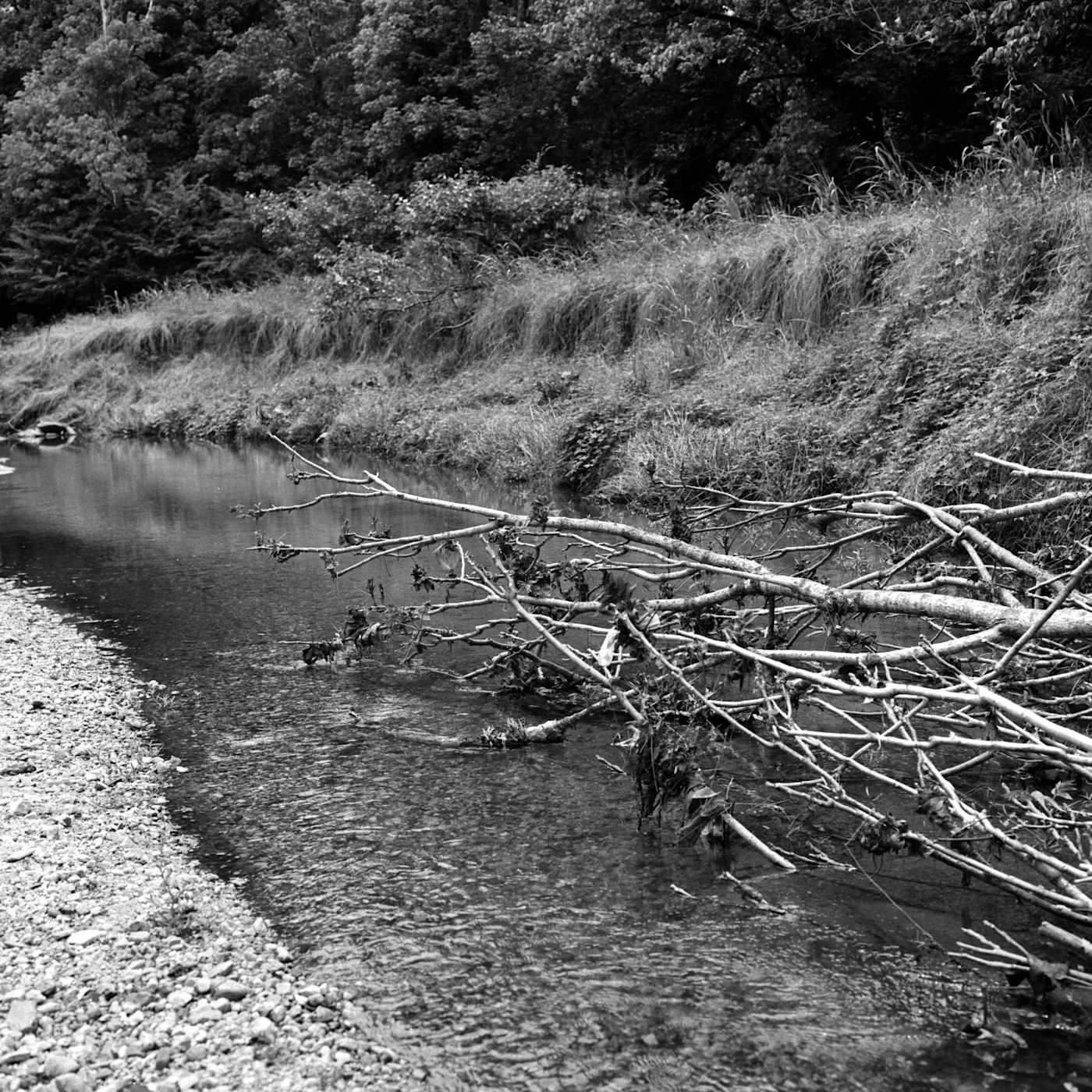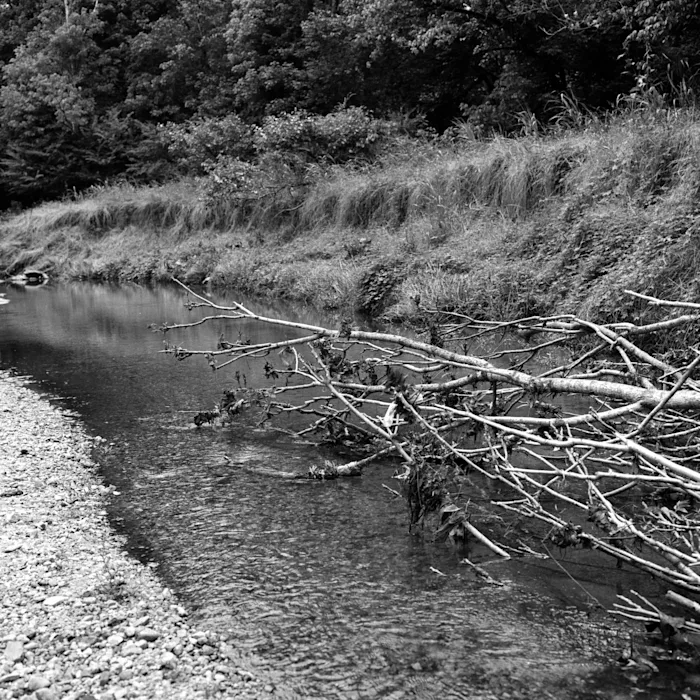Satellite Signals for the Atlanta Forest
Frédéric Neyrat
“A land [terre] has no limits. That is the reason it is worth defending against every form of alienation.” —Édouard Glissant
The forest beyond the forest
Some explosions can be heard from afar, like the one that followed the death of a young person named Manuel Esteban Paez Terán, or “Tortuguita” to their friends. Their crime was to protect the Weelaunee Forest (also known as the South River Forest) from the construction of a police training center and film studios. Protecting this forest in Atlanta concerns all of us: the activists who are directly involved in the site of this political struggle, but also those who, wherever they are, know that what happens in Atlanta is relevant to their lives, present and future. The forest extends beyond its own boundaries, through voices and metaphors, joy and mourning — while the power to cancel the forest and the forest’s capacity to say no are pitted against each other.
As a satellite
It is as a satellite that I write this text for the Weelaunee Forest, for those who resist there, live there or just pass by. As a satellite, because I do not speak in the place of those who are directly exposed to the police brutality taking place; still, my text orbits around a center of attraction that does not reduce itself to a mere discursive domain. Satellite signals can serve to transmit what happens in every corner of the world, where the life of the spirit finds a tactical use that favors the people. The function of the satellite is only temporary: rather than staking out a permanent position, our role is to extend the frequency reach of the ongoing political situation, and to create a communication loop between different positions of existence. A good satellite tries to turn as little as possible around themself.
Exterritory
In his Poetics of Relation (1990), Édouard Glissant explains why he rejects the “sacred” concept of territory, which he finds to be stamped with the seal of conquest, of rapine, of colonial occupation, of anchoring in an identity closed in on itself. To this term, he opposes that of “terre,” which we could translate as “land”: a “terre” is open to otherness, to wandering (“errance” in French — note that “erre” can be heard in “terre”), and to the totality of the world that communicates itself from echo to echo, from one opaque zone to another. It could be said that the territory at stake in the defense of the Atlanta forest exhibits certain features that Glissant attributes to that of “terre” — after all, there is a semantic proximity, lost in the English translation, between “territoire” and “terre.” Perhaps we should distinguish between two types of territory: one based on identity, founded on the fantasy of a clear and distinct interiority protected by the forces of death; the other based on the outside and the sharing of forms of life. Whereas the former seeks to reduce itself to a (dangerously phantasmatic) pure self, the latter opens up its territory to that which cannot be reduced to it, to that which exceeds it; closed territory on the one hand, exterritory on the other.1 A place of existence before being a place of habitation, the exterritory is that unruly space of vagabond forms that humans transiently adopt.


Emptied territories
Shadowbox Studios Atlanta is the name of the company looking to replace part of the Weelaunee Forest with recording studios. Among the films this production company boasts is Jumanji: The Next Level (2019). Here is its script: “When Spencer goes missing, his group of friends return to Jumanji to travel unexplored territories and help him escape the world’s most dangerous game.” Shadowbox Studios Atlanta’s new unexplored territories will be the result of an act of eviction — filming in the void following the eviction of its defenders, just as the Muscogee Creek people who once lived there were likewise evicted. Cutting down trees, killing activists, producing a void in order to fill it with images: such is the aesthetic-political program of the forest-clearers, the depopulators of the world.
What to preserve?
In 2017, the Weelaunee Forest was still considered one of Atlanta’s most important “lungs”— this, according to the city’s planning department, who observed:
We’re going to design the tree canopy that surrounds the core of the city so that it continues to generate fresh air, shade and other ecological services … we'll protect the tremendous tree canopy that blankets Atlanta’s neighborhoods. We’ll defend and enlarge this amazing asset.2
But a choice has been made in favor of a shooting range (a known cause of heavy metal pollution), paving over naturally permeable surfaces (which will make Atlanta more vulnerable to flooding), and destroying the canopy (a heat buffer zone) — in short, a choice against the environment and in favor of the police. It was this choice that led to what I would learn on Saturday, January 28, 2023, while writing these lines: the death of Tyre Nichols, an African-American man beaten by Memphis police officers. For the police are on the side of the depopulation agents, and in their training centers, they learn to militarize themselves against justice.
Reversing the inversion
What is happening in Atlanta is happening elsewhere: wherever we find people who are attempting to protect natural places, who care for the future as well as the past, who do not want to live in a world devastated by global warming, who affirm and defend extra-identitarian forms of existence, their thoughts and the acts that follow from them are considered crimes — and, as is the case with the Atlanta activists, they are even charged with domestic terrorism, just as in France, the Minister of the Interior describes those who oppose the construction of agricultural mega-basins as “eco-terrorists.” Such is the absolute perversion of the present order of things: the more we seek to protect life, the more we are sentenced to death. A perversion that also serves as a revelation of what lies at the heart of all power. But if the order of the world is upside down, then we must find a way to reverse the inversion — to dismantle the structures that annihilate existence.
Planetary communication (a dream)
Let us imagine for a moment that every place in the world is a forest — a lake, a desert, or a cloud — a real or ghostly forest, full of life or reduced to a tree on the street corner; a lake or a puddle; a cloud that provides the water I need. There would therefore be nowhere on Earth that is not affected by what the depopulators do with it, nowhere on Earth without a potential act of political resistance. From that point forward, an underlying communication between all the parts of Earth, a communication not constructed step by step, but immediately active: what would be the community that would surface from this planetary communication? Wouldn’t it be both itself and more-than-itself? Present and spectral? Wouldn’t it be obliged to protect its exterritories in order to continue to be more than merely itself?
Images: Weelaunee Forest, by Sasha Tycko
Notes
1. I write this paragraph after having read Hugh Farrell’s “The Strategy of Composition,” and having been particularly affected by this passage: “Any possible program or strategic platform can no longer be unidirectional, but must instead be permeable, i.e., constitutively open to their outside, and perhaps even defined by it.” Hugh Farrell, "The Strategy of Composition," Ill Will, January 14 2023. Online here.↰
2. “The Atlanta City Design: Aspiring to the Beloved Community.” Online here. See also Charles Bethea, “The New Fight Over an Old Forest in Atlanta,” The New Yorker, August 2022. Online here.↰